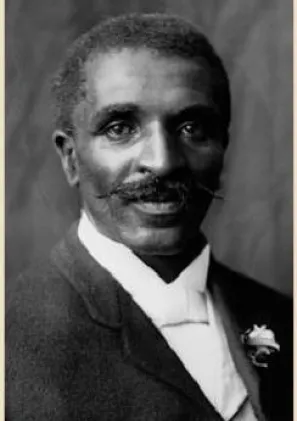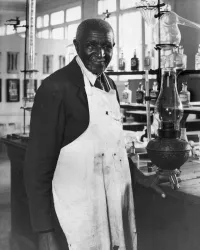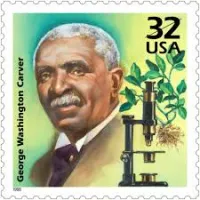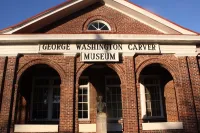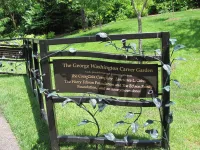Biography
1864 - 1943
"How far you go in life depends on your being tender with the young, compassionate with the aged, sympathetic with the striving and tolerant of the weak and strong. Because someday in your life you will have been all of these."
- George Washington Carver
Though he was born into slavery, George Washington Carver struggled and persisted in his quest for an education in the early years of the post-Civil War South. After obtaining his Master's degree, Carver was invited to lead the Agriculture Department at the Tuskegee Institute in 1896 and remained there for 47 years. Because decades of aggressive cotton farming had depleted the soil of vital nutrients, Carver's research focused on finding crop alternatives to cotton – such as peanuts and sweet potatoes – which he wanted poor farmers to grow as a source of food and other products to improve their quality of life. While analyzing which nutrients various crops took from the soil - and left behind - Carver developed the theory that would become his greatest contribution to Agricultural Science: "Crop Rotation". This revolutionary practice - now quite commonplace - became the most efficient way to restore the chemical balance of the soil. It also introduced newly marketable food-stuffs and derivative products that could be made and sold to boost the economic fortunes of former slaves still trapped in poverty. Carver’s scientific achievements challenged racial stereotypes, eventually making him the most famous African American of all time. Business leaders like Henry Ford came to seek his advice, as well as American presidents Theodore Roosevelt, Calvin Coolidge and Franklin Roosevelt. Though his renown helped to raise the profile of Tuskegee (along with desperately needed funds) administrators worried about potential scandal from the persistent rumors that he was gay – especially after 1935 when Carver became life partners with fellow researcher Austin W. Curtis, Jr. – a relationship which endured until Carver’s death in 1943. Curtis, who inherited much of Carver’s estate, continued his work despite being summarily banished from Tuskegee once Carver was gone. Rumors aside, on July 14, 1943, President Franklin D. Roosevelt authorized $30,000 for the George Washington Carver National Monument – the first to be dedicated to an African American and also the first to a non-President. Though numerous awards and accolades have been bestowed upon Carver, his most enduring tribute comes from America's public school system through all the elementary and high schools which still bear his name.
1864 - 1943
"How far you go in life depends on your being tender with the young, compassionate with the aged, sympathetic with the striving and tolerant of the weak and strong. Because someday in your life you will have been all of these."
- George Washington Carver
Though he was born into slavery, George Washington Carver struggled and persisted in his quest for an education in the early years of the post-Civil War South. After obtaining his Master's degree, Carver was invited to lead the Agriculture Department at the Tuskegee Institute in 1896 and remained there for 47 years. Because decades of aggressive cotton farming had depleted the soil of vital nutrients, Carver's research focused on finding crop alternatives to cotton – such as peanuts and sweet potatoes – which he wanted poor farmers to grow as a source of food and other products to improve their quality of life. While analyzing which nutrients various crops took from the soil - and left behind - Carver developed the theory that would become his greatest contribution to Agricultural Science: "Crop Rotation". This revolutionary practice - now quite commonplace - became the most efficient way to restore the chemical balance of the soil. It also introduced newly marketable food-stuffs and derivative products that could be made and sold to boost the economic fortunes of former slaves still trapped in poverty. Carver’s scientific achievements challenged racial stereotypes, eventually making him the most famous African American of all time. Business leaders like Henry Ford came to seek his advice, as well as American presidents Theodore Roosevelt, Calvin Coolidge and Franklin Roosevelt. Though his renown helped to raise the profile of Tuskegee (along with desperately needed funds) administrators worried about potential scandal from the persistent rumors that he was gay – especially after 1935 when Carver became life partners with fellow researcher Austin W. Curtis, Jr. – a relationship which endured until Carver’s death in 1943. Curtis, who inherited much of Carver’s estate, continued his work despite being summarily banished from Tuskegee once Carver was gone. Rumors aside, on July 14, 1943, President Franklin D. Roosevelt authorized $30,000 for the George Washington Carver National Monument – the first to be dedicated to an African American and also the first to a non-President. Though numerous awards and accolades have been bestowed upon Carver, his most enduring tribute comes from America's public school system through all the elementary and high schools which still bear his name.
Lesson Plan
Please login or register for an account to view this lesson plan.
Demography
Demography
Gender Male
Sexual Orientation Gay
Gender Identity Cisgender
Ethnicity African American Black
Faith Construct Protestant
Nations Affiliated United States
Era/Epoch Gilded Age (1865-1900) Jazz Age (1910-1940) Progressive Era (1890-1920)
Field(s) of Contribution
Academics
Education
Inventor
Science
Social Sciences
STEM & Medicine
US History
Commemorations & Honors
NAACP Spingarn Medal (1923)
Honorary Doctorate from Simpson College (1928)
Roosevelt Medal for Outstanding Contribution to Southern Agriculture (1939)
Carver Established George Washington Carver Foundation at the Tuskegee Institute (1940)
George Washington Carver Museum Dedicated at the Tuskegee Institute (1941)
George Washington Carver National Monument Established in Missouri by President Franklin Delano Roosevelt (1943)
Liberty ship SS George Washington Carver Launched (1943)
U.S. Postal Service Commemorative Stamp (1948)
U.S. Mint Features Carver on a 50 Cents Silver Commemorative Coin (1951-1954)
Ballistic Missile Submarine USS George Washington Carver Launched (1965)
Carver Hall at Iowa State University Erected In His Honor (1969)
Posthumous Hall of Fame for Great Americans Inductee (1977)
Posthumous National Inventors Hall of Fame Inductee (1990)
Iowa State University Awarded Carver a Doctor of Humane Letters (1994)
Carver Honored in the Celebrate the Century USPS Stamp Sheet Series (1998)
USDA Hall of Heroes Charter Inductee as the Father of Chemurgy (2000)
Carver's Research at the Tuskegee Institute Designated a National Historic Chemical Landmark by the American Chemical Society (2005)
Part of Missouri Botanical Gardens Named After Carver With a Commemorative Statue (2007)
Demography
Gender Male
Sexual Orientation Gay
Gender Identity Cisgender
Ethnicity African American Black
Faith Construct Protestant
Nations Affiliated United States
Era/Epoch Gilded Age (1865-1900) Jazz Age (1910-1940) Progressive Era (1890-1920)
Field(s) of Contribution
Academics
Education
Inventor
Science
Social Sciences
STEM & Medicine
US History
Commemorations & Honors
NAACP Spingarn Medal (1923)
Honorary Doctorate from Simpson College (1928)
Roosevelt Medal for Outstanding Contribution to Southern Agriculture (1939)
Carver Established George Washington Carver Foundation at the Tuskegee Institute (1940)
George Washington Carver Museum Dedicated at the Tuskegee Institute (1941)
George Washington Carver National Monument Established in Missouri by President Franklin Delano Roosevelt (1943)
Liberty ship SS George Washington Carver Launched (1943)
U.S. Postal Service Commemorative Stamp (1948)
U.S. Mint Features Carver on a 50 Cents Silver Commemorative Coin (1951-1954)
Ballistic Missile Submarine USS George Washington Carver Launched (1965)
Carver Hall at Iowa State University Erected In His Honor (1969)
Posthumous Hall of Fame for Great Americans Inductee (1977)
Posthumous National Inventors Hall of Fame Inductee (1990)
Iowa State University Awarded Carver a Doctor of Humane Letters (1994)
Carver Honored in the Celebrate the Century USPS Stamp Sheet Series (1998)
USDA Hall of Heroes Charter Inductee as the Father of Chemurgy (2000)
Carver's Research at the Tuskegee Institute Designated a National Historic Chemical Landmark by the American Chemical Society (2005)
Part of Missouri Botanical Gardens Named After Carver With a Commemorative Statue (2007)
Resources
Resources
Brodie, James Michael. Created Equal: The Lives and Ideas of Black American Innovators. New York: William Morrow, 1993.
Griffin, Horace L. Their Own Receive Them Not: African American Lesbians & Gays in Black Churches. Cleveland, Ohio: The Pilgrim Press, 2006.
McMurry, Linda O. George Washington Carver: Scientist and Symbol. New York and Oxford: Oxford University Press, 1981.
https://en.wikipedia.org/wiki/George_Washington_Carver
http://www.nndb.com/people/582/000030492/
https://www.biography.com/people/george-washington-carver-9240299
Resources
Brodie, James Michael. Created Equal: The Lives and Ideas of Black American Innovators. New York: William Morrow, 1993.
Griffin, Horace L. Their Own Receive Them Not: African American Lesbians & Gays in Black Churches. Cleveland, Ohio: The Pilgrim Press, 2006.
McMurry, Linda O. George Washington Carver: Scientist and Symbol. New York and Oxford: Oxford University Press, 1981.
https://en.wikipedia.org/wiki/George_Washington_Carver
http://www.nndb.com/people/582/000030492/
https://www.biography.com/people/george-washington-carver-9240299
